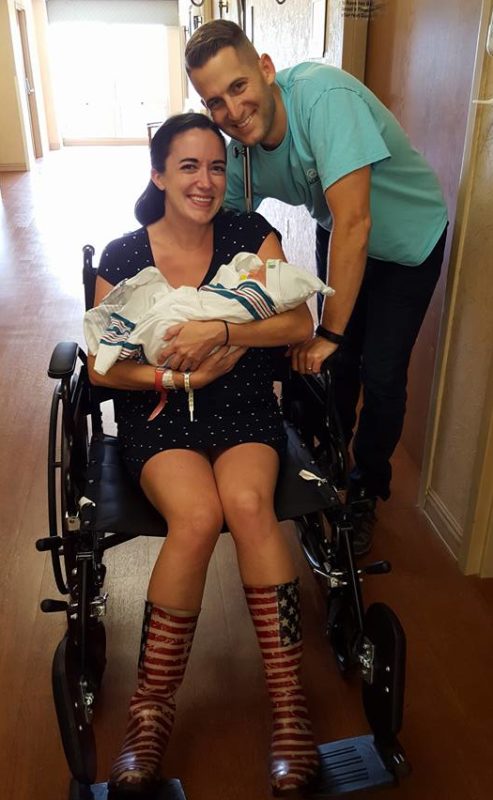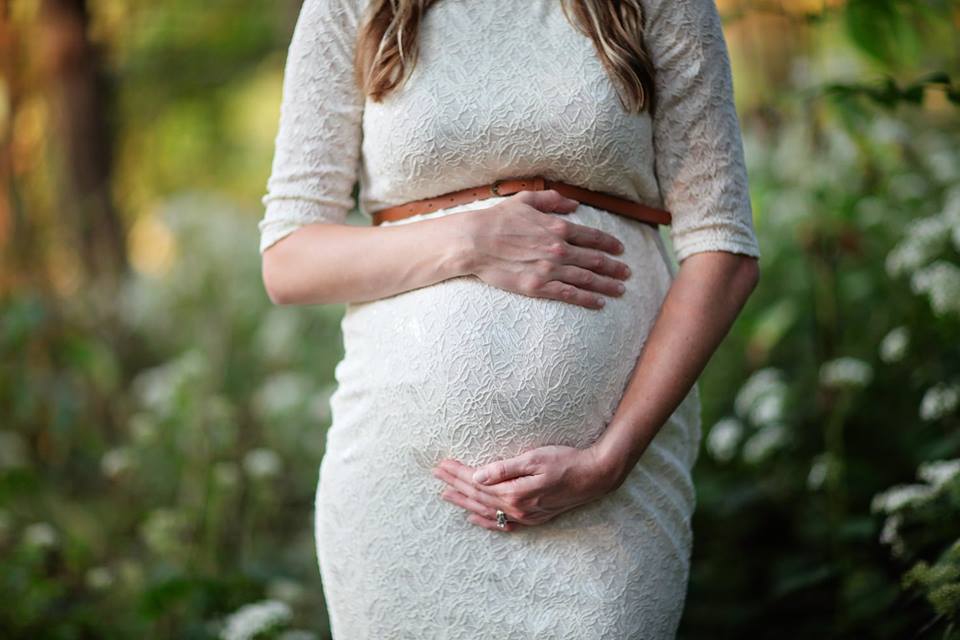Do you have a hurricane birth plan? Are you due any time from now until November 30, the official end of hurricane season? Check out these tips for creating your own hurricane birth plan from a mom who learned first-hand.
This time last year, I was just two days away from giving birth to my first baby (though I didn’t know it at the time). While I’d already created my birth plan, there were a few extras that I needed to add as we watched Hurricane Irma move closer to Orlando each day.
I ended up going into labor on a Thursday night and went to the hospital Friday morning as my mom was on a flight from Florida from Connecticut. I gave birth to Killian at 12:10PM, my mom arrived in the delivery room 30 minutes later, and I left the hospital on Saturday afternoon to avoid the hurricane lockdown. Hurricane Irma hit Orlando that night and we lost power on Sunday morning. My husband and I packed up my mom and our newborn and our dog to visit my in-laws for Tuesday night until our power returned, and then we finally returned to our house on Wednesday afternoon.
It was my first hurricane and our first baby, so my husband and I certainly learned some things along the way. The most important thing I learned? Have a hurricane birth plan in place.
Don’t have a hurricane birth plan yet? Here are some ways to get started!
1. Make an evacuation plan (even if you don’t evacuate.)
Sometimes, the choice to evacuate is made at the last minute, after you’ve tried to stick out the storm and finally realized that you need to leave – now. In those cases, you won’t have time to print out your prenatal medical history, look up a new hospital where you’re going, call your insurance plan to find an in-network physician or midwife, etc. Even if you don’t end up needing to evacuate, it’s wise to have a plan in case you do need to relocate and give birth elsewhere.
Keep hard copies of important information like your medical records throughout pregnancy so that you can give them to your new doctor if you need to evacuate. Identify an in-network provider with your insurance place ahead of time so that you aren’t left paying out-of-pocket for your delivery. For all of the planning that you’ve done to give birth here, duplicate that for another place in case you need to go there.
2. Know that your hospital might go into lockdown.
I’d originally planned on staying in the hospital for 48 hours after I delivered Killian, but I went home just after 24 hours to avoid becoming trapped in the hospital’s lockdown.

Hurricane Irma was set to hit Orlando on Saturday night, so the hospital went into lockdown that afternoon to prepare.
LOCKDOWN MEANT…
- no one would be admitted to enter/leave the hospital until the storm had passed
- each patient was allowed only one visitor to stay throughout the storm
- visitors were responsible for their own food/drink.
My mom had just flown into town and was staying with us, I didn’t want my husband to leave her alone through the hurricane to be with me at the hospital, and we didn’t have anyone to watch our pets if no one was at the house. For me, lockdown wasn’t the best option, but it might be for you.
If you’re due to give birth in a hospital during hurricane season, check their lockdown procedures and create a hurricane birth plan with your family accordingly.
If you give birth during lockdown and don’t have the option to leave before it begins:
- Will your spouse come with you and leave the house alone during the storm?
- Do you have someone to watch your pets or other children if you’re forced into lockdown?
- Can a friend stay at the hospital with you while your spouse stays home with kids or pets, etc.?
- If someone comes with you to the hospital during a lockdown, also make sure that he/she has food with them.
3. You might lose power, water, access to supermarkets, etc.
You should always stock enough food/water/supplies to last up to two weeks without power, but a hurricane birth plan should also involve other supplies that are specific to having a newborn at home. Stock plenty of diapers, burp cloths, pads or after-care for yourself, Gatorade or other ways to keep yourself hydrated, and so on. You might be unable to do laundry for a week or two, so have a plan in case you run out of clean clothes for a baby who will inevitably spit up.
Even if you plan to breastfeed, know that things might not go according to plan for the first few days. Buy a handheld breast pump or a battery-operated one in case you need to pump and don’t have electricity. Buy formula regardless, because you might need it for even the first few days while your milk supply comes in, and you don’t want to be stranded without formula when all of the pharmacies and supermarkets are closed for days. Have nursery water available as well for mixing and washing baby bottles and pacifiers. My tip: spend the extra few dollars on pre-made bottles like Enfamil’s ready to use bottles. In the middle of the night during Hurricane Irma, when we had no power and I was trying to make a bottle by flashlight for a crying baby, having these already made was a lifesaver.
4. Join Facebook groups in your town for updates on available supplies, road closures, etc.
After Hurricane Irma hit, our entire area lost power, and we had no supermarkets, pharmacies, restaurants, etc. We didn’t have time to drive all over town in search for anything that had reopened because we were too busy learning to take care of our first baby in the midst of a post-hurricane Orlando.
Luckily, with the Facebook groups in our town, we didn’t need to leave our house in order to know what was happening in the community. Folks posted to the groups when the CVS reopened, they posted when a restaurant opened but had a 3-hour wait due to crowds, and they posted when certain roads were still flooded or blocked by downed trees.
If you aren’t already a member of a Facebook group for residents of your town, then it’s wise to join a few of them as part of your hurricane birth plan. You can turn off the notifications for the groups while still being able to check them after a hurricane for real-time updates across your community.
5. Go with the flow – it’ll be a good story (or blog post) later in life.
Nothing about Killian’s birth went according to plan, including the hurricane that followed. We couldn’t reach our pediatrician because cell phone reception was so bad, the hospital couldn’t fax Killian’s birth records to his doctor because the fax line was down at the pediatrician’s office, we couldn’t get Killian officially added to our insurance for a few weeks because the insurance office was closed for repairs, and the list of “things that went wrong” just goes on and on.
But the first rocky days and weeks of our new lives as parents was an adventure. It taught us to roll with the punches and to let go of things that were out of control. We asked for help when we needed it and even received it when we didn’t, like when our neighbors came over to give us ice when the power was out and temperatures were still blistering.
And now, just days away from Killian’s first birthday, I love the story that we can tell him someday. It wasn’t fun at the time, but it’s a fun memory now. And if I’m being honest, I’m sure that “wasn’t fun at the time…but a good memory now” is how I’d describe any of the newborn days, with or without a hurricane!
Have you given birth before or during a hurricane? What did you find helpful? Share your story in the comments below!


















